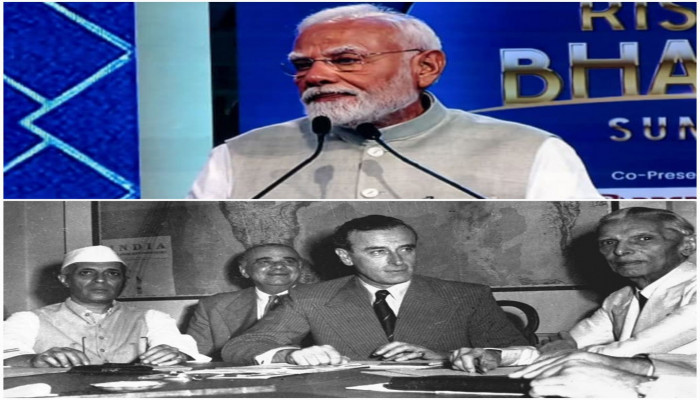PM Modi blames Congress-backed fundamentalists for Partition, speaks on Waqf issue Post Amendment Act
- In Reports
- 04:32 PM, Apr 09, 2025
- Myind Staff
Speaking at CNN-News18’s Rising Bharat Summit on Tuesday, Prime Minister Narendra Modi spoke about the origins of India’s partition. He said it wasn’t the idea of regular Muslim families but was pushed by “some fundamentalists, who were nourished by some Congress leaders so that they could become the sole claimants of power". This was also the first time PM Modi spoke at length about the Waqf issue after the Amendment Act was passed in Parliament and received presidential assent.
“The politics of appeasement have been a big challenge in India’s growth. Recently, the law related to Waqf was amended in Parliament. Your network has also discussed this a lot. This debate related to Waqf has the politics of appeasement at its core," PM Modi said during the event.
Ahead of possible protests from Muslim groups and opposition parties over the Waqf Amendment Act, PM Modi’s speech aimed at the Muslim community clearly stated the government’s position amid legal pushback against the law. He criticised Congress, saying its politics of appeasement and support for extremist ideas were responsible for Partition, which ended up harming many poor and marginalised Muslims, especially women.
Comparing it with the partition of India, the Prime Minister said, “This politics of appeasement is not new. Its seed was sown during our freedom struggle itself. Just think, before India, along with India, and after us, many countries in the world became independent. But how many countries are there whose condition for independence was partition? How many countries have broken up with independence? Why did this happen only with India? Because at that time, the desire for power was placed above the interest of the nation".
Prime Minister Modi stated that the idea of creating a separate nation wasn’t something supported by most Muslim families. “Rather, it was of some fundamentalists, who were nourished by some Congress leaders so that they could become the sole claimants of power," he said. He went on to say that Congress and certain radical leaders gained influence and wealth by following a politics of appeasement but questioned how this approach actually helped regular Muslims. “What did the common Muslim get? What did the poor Pasmanda Muslim get? They got neglected. They got illiteracy. They got unemployment. And what did Muslim women get? They got injustices like Shah Bano, where their constitutional rights were sacrificed to fundamentalism. They got orders to remain silent pressure not to ask questions. And fundamentalists got an open licence to crush the rights of women," he expressed.
Modi criticised the policy of appeasement, calling it a betrayal of the principle of social justice, and accused Congress of using it merely to gain votes. Referring to the 2013 changes in the Waqf Act, he said, “The amendment made in the Waqf Act in 2013 was an attempt to please Muslim fundamentalists and land mafias. This law was given such a shape that it created an illusion of standing above the Constitution. The Constitution, which opened the paths of justice, but those very paths were narrowed down by the Waqf Act. And what were its ill effects? The spirits of fundamentalists and land mafias were boosted."
Prime Minister Modi pointed to several land disputes involving Waqf claims, including land owned by Christian villagers in Kerala, gurdwara land in Haryana, farmers' land in Karnataka, and other villages across different states. He noted that thousands of hectares were caught up in legal hurdles due to the need for No Objection Certificates (NOCs). Criticising the Waqf Act 2013, he remarked, “Be it temples, churches, gurdwaras, farms, government lands, no one was sure that their land would remain theirs. Just one notice would come, and people would keep searching for papers for their own houses and farms. The law, which was for justice, became a cause of fear. What kind of law was this?"
Modi praised Parliament for passing what he called a “wonderful law" to protect the true spirit of Waqf and the rights of marginalised groups. “Now the sacred spirit of Waqf will be protected, and the rights of the poor, Pasmanda Muslims, women, and children will also be protected," he said.
He also highlighted that the debate on the Waqf Bill was one of the most extensive in independent India’s history. “Both houses discussed this bill for 16 hours. 38 meetings of JPC were held, and discussions were held for 128 hours. About one crore online suggestions came from all over the country. This shows that today, democracy in India is not limited to the four walls of Parliament. Our democracy is becoming stronger with public participation," the Prime Minister stated.







Comments